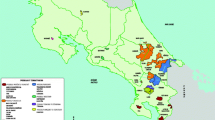
Overview
- Presents a novel comparative approach to climate policy integration
- Identifies pathways for climate policy integration through causal mechanisms
- Shows ways of measuring the degree of climate policy integration
Part of the book series: Springer Climate (SPCL)
Access this book
Tax calculation will be finalised at checkout
Other ways to access
About this book
This book analyzes climate policy integration processes by investigating cause-effect relations in cases of integrating climate policy in energy and land-use sectors of Indonesia and Mexico, taking a novel comparative case study approach. The book identifies root causes for integration outside of the public administration, discussing decisive factors in the political economy of the energy and land-use sectors. Showing how policy windows may open for the successful integration of climate policies nevertheless, the book addresses the need to identify and properly use these windows to establish the administrative and institutional arrangements for effective climate policy implementation.
This book offers two-fold insights for overcoming the challenges posed by climate policy integration: Firstly, it contributes to theory-building by amending theories of the policy process and by taking a wider perspective on the role of integration in the context of transformational change processes in emerging economies. Secondly, it sets forth a set of research-based practical policy recommendations on how to foster climate policy integration in the political decision-making processes as well as the public administration structures. Therefore, this book will appeal to scholars and researchers of public policy, public administration, political science, and environmental sciences, as well as policy-makers and practitioners interested in a better understanding of climate policy integration in energy and land-use sectors.Similar content being viewed by others
Keywords
- Climate governance
- Energy policy
- Climate policy indicators
- Land-use policy
- Emerging economies
- Policy coordination
- Climate compatible development
- Transformational change
- Mexico
- Indonesia
- Energy sector
- Forestry
- Agriculture
- Rural development
- Political agenda
- REDD+
- Deforestation
- Fossil fuel economy
- Natural resources
- Renewable energy
Table of contents (8 chapters)
-
Front Matter
-
Climate Policy Integration: Widely Called for, But Contested in Implementation
-
Front Matter
-
-
Pathways for Climate Policy Integration
-
Front Matter
-
-
The Bigger Picture: Climate Policy Integration Approaches in the Context of Transformational Change
-
Front Matter
-
-
Back Matter
Authors and Affiliations
About the author
Bibliographic Information
Book Title: Climate Policy Integration
Book Subtitle: A Comparative Analysis of Land Use Change and Energy Sectors in Indonesia and Mexico
Authors: Heiner von Lüpke
Series Title: Springer Climate
DOI: https://doi.org/10.1007/978-3-031-18927-2
Publisher: Springer Cham
eBook Packages: Political Science and International Studies, Political Science and International Studies (R0)
Copyright Information: The Editor(s) (if applicable) and The Author(s), under exclusive license to Springer Nature Switzerland AG 2022
Hardcover ISBN: 978-3-031-18926-5Published: 01 December 2022
Softcover ISBN: 978-3-031-18929-6Published: 02 December 2023
eBook ISBN: 978-3-031-18927-2Published: 30 November 2022
Series ISSN: 2352-0698
Series E-ISSN: 2352-0701
Edition Number: 1
Number of Pages: XX, 254
Number of Illustrations: 1 b/w illustrations
Topics: Public Policy, Climate, general, Public Administration, Political Economy/Economic Systems, Environmental Policy, Development Studies



